|
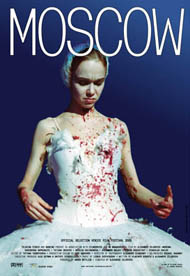 Moscow Believes in Tears
Moscow Believes in Tears
Aleksandr Zeldovich's Moskva
Andrew James Horton
Nowadays it is fashionable for a major film release to be accompanied by the publication of its screenplay. But for his film Moskva (Moscow, 2000), Aleksandr Zeldovich published the script, written jointly with the enfant terrible of Russia's literary establishment Vladimir Sorokin, before shooting even began. The result was a literary sensation, and the script was nominated for the Russian Booker Prize.
Taking the genre of the gangster film, Zeldovich and Sorokin used the dialogue to create a tense portrait of the 1990s and to evoke the changing power structures in a Russia, where Communism has given way to what Zeldovich terms the "new totalitarianism."
Ballet and business
The film centres on Mike, a businessman in decidedly the "new Russian" mould. When Mike gets stung on a deal, his suspicions immediately fall on Lev, who receives the customary torture to make him reveal where the money has gone. When Lev doesn't confess, Mike's suspicions waver and turn to other quarters, but as a precaution he still keeps Lev close at hand, locked up in the nightclub of an old friend and lover, Irina.
Here, Lev meets both Irina's daughters: Masha, who is engaged to Mike, and  Olga, who suffers from autism which she has treatment from another of Irina's old flames, Mark. Mark is also secretly in love with Olga and commits suicide when he discovers that her innocence has been lost. Olga, who suffers from autism which she has treatment from another of Irina's old flames, Mark. Mark is also secretly in love with Olga and commits suicide when he discovers that her innocence has been lost.
Despite the financial problem the disappearing money brings Mike, he goes ahead with an ambitious plan to open a new ballet school and theatre. His love of ballet also leads him to hold his wedding reception at an opera house, where during a performance of an extract of The Dying Swan, Mike is gunned down by a sniper.
With Mike disposed of, Lev is able to collect the money that he swindled Mike out of and with his new-found wealth marries both Masha and Olga at a double wedding ceremony attended by Irina.
More than just a genre film
Moskva is just one of a whole slew of gangster films to have emerged from Russia since the Soviet Union disintegrated, with film-makers inexorably drawn to depicting the sleazily luxurious life of the New Russians like moths to the light.
 | | Zeldovich | However, when CER spoke to Zeldovich at the 44th London Film Festival last year, he insisted that Moskva was different. Citing the need to create a national market after the fall of Communism, Zeldovich noted that genre films were a quick and cheap way of ensuring an audience. "Basically as a result, especially the first attempts were weak copies of B (and probably C) genre movies," he explained, adding that these cheap gangster films became something of a national product. Although he admits that some of them are "not bad" now, Moskva is not a genre film and its use of the gangster genre is only a "construction" in which to hold the dialogue.
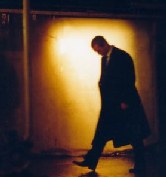 Moskva, as a film about the 1990s, draws on the cheapness of gangster films and uses them both to create the emotional and spiritual atmosphere of an era in which the genre dominated and as a metaphor for processes in society. Moskva, as a film about the 1990s, draws on the cheapness of gangster films and uses them both to create the emotional and spiritual atmosphere of an era in which the genre dominated and as a metaphor for processes in society.
However, Zeldovich also insists that inclusion of the crime elements was an essential part of the film's realism in the portayal of the decade:
In the 90s people were very often asking have you seen this guy or this one and the answer was no, I haven't seen him or him for a week or a couple of weeks. These people were somehow disappearing and never coming back. It was a time of disappearing people. And it was an everyday event... so that means that the criminality of this life really existed.
Breaking up and breaking down
Zeldovich's Moscow is not just over-ridden with crime, it is a dysfunctional  and cynical world. This disfunctionality is symbolically portrayed in the important character of Olga, who in her regressive, autistic state is unable to communicate with the real world. Zeldovich, though, emphasises that all the characters are in some way autistic, with a total inability to relate to those around them. and cynical world. This disfunctionality is symbolically portrayed in the important character of Olga, who in her regressive, autistic state is unable to communicate with the real world. Zeldovich, though, emphasises that all the characters are in some way autistic, with a total inability to relate to those around them.
The depiction of the cynicism of the age, is perhaps less damning, with the director pointing out that:
The only privilege—well, not the only one, but the main one—which the Soviet system brought out was cynicism. Which, in a way, it's not too bad somehow, because it brings with it some sort of tolerance and adaptability for survival. But, on the other hand, it is quite poisoning. So, that is the problem: how to cope with this heritage in some positive and normal way.
Lingering totalitarianism
Moskva, of course, is more than just a film about the Russian capital, and its themes of ideological heritage are international. What makes Moscow in the 1990s such a fascinating subject, is that it is a city caught between the end of totalitarianism and a failed attempt to provide a new ideology (free-market capitalism).
Zeldovich continually shows us the remains of the old ideology, which has 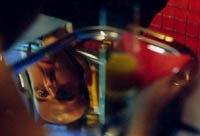 somehow failed to go away: Mike's curiously passionate interest in ballet, the old Stalinist songs that Olga sings but does not understand and the newly married Lev standing before the eternal flame. somehow failed to go away: Mike's curiously passionate interest in ballet, the old Stalinist songs that Olga sings but does not understand and the newly married Lev standing before the eternal flame.
Zeldovich was keen to assert that this has a wider implication than for just Russia:
The twentieth century has been a century of totalitarianism and a century of ideological construction, not only in Russia but I think all around the world and in the West as well. So, for nearly 100 years the West finds itself in this opposition, and finally in the 1990s this opposition was exploded... and now it is over it has produced a sort of frustration... the democratic West somehow needs a totalitarian mirror.
As such, the decline of the old ideology and its supplanting with a new totalitarianism is something which has global implications. Expounding on his theme, Zeldovich even ascribes the recent interest in Iranian cinema to this need for the West to think in terms of ideological opposition.
All in the script
If Moskva has won praise, it is not for its use of plot, which is almost completely dispensible. The real attraction of the film has been the dialogue, written by Zeldovich in collaboration with "conceptualist" writer 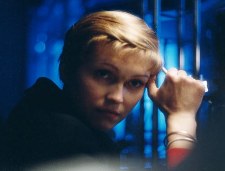 Vladimir Sorokin. Conceptualism started as a tendency in the visual arts in the late 1970s, with ordinary signs and billboards taken and put in a gallery as a piece of art and given a new meaning in addition to the one they originally had. These small details of everyday life became metonymic symbols for the functioning of society. Moskva's dialogues work on a similar metonymic principle Vladimir Sorokin. Conceptualism started as a tendency in the visual arts in the late 1970s, with ordinary signs and billboards taken and put in a gallery as a piece of art and given a new meaning in addition to the one they originally had. These small details of everyday life became metonymic symbols for the functioning of society. Moskva's dialogues work on a similar metonymic principle
Zeldovich also compares the dialogues in Moskva to those in Chekhov (with the mother and two daughters becoming the playwright's three sisters). The tea drunk from samovars may be long gone and replaced with tequilla, but the construction of conversation through a web of contemporary clichés Zeldovich considers to be entirely Chekhovian.
This use of cliché in dialogue also has some bearing on the film's plot. As Zeldovich explained:
When we started to rehearse, it was clear that these dialogues could not exist in normal, natural environment. It needed some artificial environment; it needed some sort of distance, because the dialogue always presumes some sort of distance between the character and the language they are speaking.
To illustrate this principle of distance, Zeldovich contrasts the characters in Moskva with those in a Hollywood movie. With the latter, what they say is what they think, and there is no difference or tension between the two. In Moskva, as indeed in Chekhov, the characters say one thing as they think another, and it is not so much important what they are saying but how they are saying it.
Mixed bag
It is instructive to compare Zeldovich's Moskva with Czech director Vladimír Michálek's Anděl Exit (Angel Exit, 2000): both were written and co-scripted by the director and a leading (and controversial) member of the 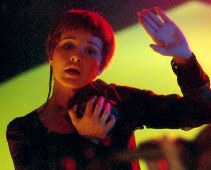 literary establishment; both are depictions of a city (Anděl is a Prague Metro station); both chart society's decay; both represent larger realities through dialogue and have plots which are almost completely irrelevant to understanding the film; both are shot in vivid extremes of colours; and they both were released at around the same time. literary establishment; both are depictions of a city (Anděl is a Prague Metro station); both chart society's decay; both represent larger realities through dialogue and have plots which are almost completely irrelevant to understanding the film; both are shot in vivid extremes of colours; and they both were released at around the same time.
With their overlapping aims and artistic means of expression, Moskva and Anděl Exit share the same strengths and weaknesses. Visually they are captivating films, but their deliberately unlikable characters and the lack of direct communication makes them unengaging to watch. This is film as sociological statement rather than as entertainment.
Moskva particularly suffers here, with Zeldovich anxious to point out
that the film's real merit—its razor-sharp dialogue—is masked from English-speaking audiences by inadequate subtitles which were prepared in something of a rush to get the film on the festival circuit. So extreme does he consider this to be a problem that another print is to be made with new English subtitles.
But beyond this, some will question Zeldovich's assertion that the film is an accurate portrayal of a decade in Moscow, with the film steadfastly refusing to look at the ordinary life of millions of Muscovites on the breadline. As such, the semantics of the new totalitarianism seems to be something of a middle-class affliction.
Andrew James Horton, 19 March 2001
Moskva showed at the 44th London Film Festival
Also of interest:
Moving on:
|




 Olga, who suffers from autism which she has treatment from another of Irina's old flames, Mark. Mark is also secretly in love with Olga and commits suicide when he discovers that her innocence has been lost.
Olga, who suffers from autism which she has treatment from another of Irina's old flames, Mark. Mark is also secretly in love with Olga and commits suicide when he discovers that her innocence has been lost.
 Moskva, as a film about the 1990s, draws on the cheapness of gangster films and uses them both to create the emotional and spiritual atmosphere of an era in which the genre dominated and as a metaphor for processes in society.
Moskva, as a film about the 1990s, draws on the cheapness of gangster films and uses them both to create the emotional and spiritual atmosphere of an era in which the genre dominated and as a metaphor for processes in society. and cynical world. This disfunctionality is symbolically portrayed in the important character of Olga, who in her regressive, autistic state is unable to communicate with the real world. Zeldovich, though, emphasises that all the characters are in some way autistic, with a total inability to relate to those around them.
and cynical world. This disfunctionality is symbolically portrayed in the important character of Olga, who in her regressive, autistic state is unable to communicate with the real world. Zeldovich, though, emphasises that all the characters are in some way autistic, with a total inability to relate to those around them. somehow failed to go away: Mike's curiously passionate interest in ballet, the old Stalinist songs that Olga sings but does not understand and the newly married Lev standing before the eternal flame.
somehow failed to go away: Mike's curiously passionate interest in ballet, the old Stalinist songs that Olga sings but does not understand and the newly married Lev standing before the eternal flame. Vladimir Sorokin. Conceptualism started as a tendency in the visual arts in the late 1970s, with ordinary signs and billboards taken and put in a gallery as a piece of art and given a new meaning in addition to the one they originally had. These small details of everyday life became metonymic symbols for the functioning of society. Moskva's dialogues work on a similar metonymic principle
Vladimir Sorokin. Conceptualism started as a tendency in the visual arts in the late 1970s, with ordinary signs and billboards taken and put in a gallery as a piece of art and given a new meaning in addition to the one they originally had. These small details of everyday life became metonymic symbols for the functioning of society. Moskva's dialogues work on a similar metonymic principle literary establishment; both are depictions of a city (Anděl is a Prague Metro station); both chart society's decay; both represent larger realities through dialogue and have plots which are almost completely irrelevant to understanding the film; both are shot in vivid extremes of colours; and they both were released at around the same time.
literary establishment; both are depictions of a city (Anděl is a Prague Metro station); both chart society's decay; both represent larger realities through dialogue and have plots which are almost completely irrelevant to understanding the film; both are shot in vivid extremes of colours; and they both were released at around the same time.
